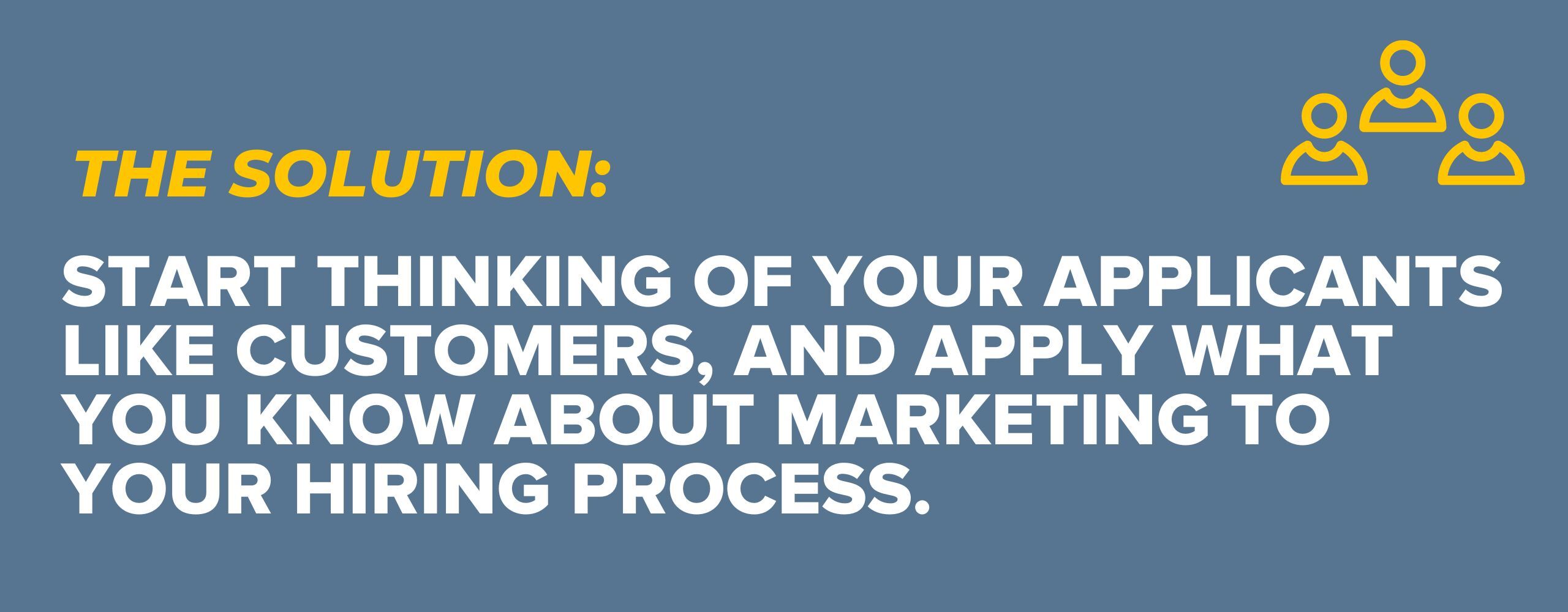Subscribe now and get the latest podcast releases delivered straight to your inbox.
Why You Need To Start Thinking of Your Candidates Like Customers

Oct 1, 2023

“It’s getting harder and harder to find good people.”
Every company I work with has expressed some version of this same frustration. Yet, at the same time, they’re getting more applications than ever before.
So, how are both true? More candidates to choose from should mean you end up with better candidates, right?
Not necessarily.
The problem is that we’ve made it way too easy to apply to jobs today. Human resource (HR) teams are flooded with resumes of varying quality, making the situation harder, not easier.
On top of that, a tight labor market and historically low unemployment means you might have to work to attract the best candidates.
The solution: Start thinking of your applicants like customers, and apply what you know about marketing to your hiring process.

The result will be better-qualified candidates, a smoother hiring process, and an easier onboarding experience.
We’ve made it way too easy to apply for jobs
I think this needs to be said: We’ve made it too easy to apply for jobs.
I know, I get it. We want to remove barriers. We want to make it easy to work for us, but we’ve gone to an extreme that’s hurting businesses and applicants.
Today, it’s easier to apply for a job than it’s ever been in the past.
No more classifieds, no more tri-folded resumes on bond paper. Today, you can apply for a job in a matter of seconds with a few clicks. If you wanted to, you could apply to 100 jobs today. Heck, you could even do that before lunchtime.
To see the result of all this ease of access, look at this: A LinkedIn job posting from four hours ago with over 200 applicants already. (To be honest, they cap their counting at 200. It could be 400. Or 2,000.)
If you’re this HR director, how are you even going to sort through this stack of virtual resumes? Are you really going to be able to find the best employee? That hungry candidate with a huge upside?
Or are you going to reach for the same old slapdash proxies for competence like alma mater or GPA?
Too many applicants, too many flameouts
In a famous study done back in 2018, Jobvite found that one-third of all new employees quit within 90 days of starting their new job. And I wouldn't be surprised if it's even higher today.
We’re inundated with resumes, and more new hires are quitting than ever before.
At the same time, job seekers are compiling an ever-longer list of what they're looking for: flexibility, perks, and culture match.
Recruiting and marketing are pretty much the same thing
The problem, it seems to me, is that companies are still approaching hiring the same way they did 10 years ago.

Instead, companies need to start thinking about hiring the way they think about marketing.
Smart marketing today avoids the pushy sales pitch, focusing instead on buyer education and trust building.
Smart marketers know that gaudy vanity metrics might boost your ego but not your bottom line.
Smart marketing today focuses on the buyer’s needs.
Now, imagine those same principles applied to your recruitment and hiring practices.
When you think about it, marketing and recruiting are closely related: Each seeks to build a positive impression of your brand, each seeks to fill a funnel with qualified individuals, and each seeks to help your business grow.
It makes sense to apply our expertise in one to the other.
Lessons from marketing to apply to recruiting
So, what can we learn from marketing to improve our recruiting and hiring?
1. Think about your funnel… but only so much
In marketing, you want to fill the top of your funnel so qualified leads come out the bottom. The danger with this approach, however, is that businesses focus too much on driving traffic, for example, without paying attention to whether that traffic has any intent to buy or not.
The same thing is true here. You want to attract from a wide talent pool, but just getting more applicants should not be your goal (more on that later). You want qualified applicants.
Fill your application funnel, but remember that it’s better to have 50 promising candidates than 500 unqualified ones.
2. Focus on education
Buyers today are wary of sales pitches and pushy tactics. They want to self-educate with on-demand content they find on the internet. When they’re ready, they’ll reach out to a salesperson.
In fact, according to a recent study from Gartner, 33% of all buyers would prefer an entirely “sales-free” sales experience — and that number’s even higher among millennials and Gen Z-ers.
I’m not saying that candidates want a touchless application experience; just that they want as much information as possible upfront to make an informed decision.
Imagine radical transparency in your hiring process.
Be fully committed to educating your applicants about duties, compensation, and all other expectations. That way, they have a complete picture of the role before they decide to apply.
And you can go even further: Educate them about the role itself, even if it's not at your company. Help them understand the industry, compensation rages, and background requirements.
What does this education look like in practice? That's up to you. It could be articles, videos, guidebooks, social posts, or anything else!
3. Be honest
You can’t focus on education without committing to honesty — whether in advertising or recruiting. Be as clear as you can about responsibilities, daily schedule, expected output, and company culture.
We advise our clients to commit to making 80% videos for use in the sales process. That is, a video that answers 80% of the questions most customers ask during the first sales meeting. That way, sales calls are more productive and personalized.
HR departments should do the same thing. Once a candidate reaches the second round, send an 80% video that covers most of what they want to know about the role and your company.
Really, you should use video from the very beginning of the hiring process.
At IMPACT, we use a platform called Workable, which is basically a hiring CRM. We ask for videos from our applicants as soon as they apply. It's a great early indicator of just how serious a candidate is — and the platform makes it really easy for both parties.
Speaking of which…
4. Use video
Video content makes up more than 82% of all consumer internet traffic. Chances are, you’re already working hard to incorporate video into your sales and marketing.
But what about hiring?
Today, LinkedIn profiles and candidate portals have replaced resumes and mailboxes, but few businesses take full advantage of these digital platforms. (For example, AI tools can screen resumes looking for specific combinations of skills and experiences.)
Video should play a major role in your communication with candidates. Beyond the 80% video mentioned above, use a platform like Workable to have applicants submit video responses so you can really get to know them.

You can also send 1:1 videos to candidates so they can see you and hear you before an interview. This will remove some nervousness and will result in a better meeting.
5. Remember that you’re hiring future brand ambassadors
HubSpot’s Flywheel model reminds us that happy customers become advocates for our brand. Word of mouth is the strongest advertising there is, so a satisfied customer is a legitimately valuable asset.

How valuable is a happy employee? Every single one spreads positivity to friends, family, and network connections.
How about that frustrated employee who quit after six months? You can expect that person to gripe and complain to anyone who will listen for years to come.
We no longer think of our relationship with a customer as ending when the purchase is made. Our relationships with employees can last years. We should always keep that in mind.
Your hiring process should reflect how you treat people. Give your applicants a taste of your culture and your values.
Hiring your next all-star
If your company’s next all-star was just sitting down now to fill out her application, what would you want her experience to be? Imagine she makes it through, gets an offer, and accepts. What would you want her first day to be like?
When you apply marketing principles to hiring, you educate your candidates so they can seamlessly join your company, quickly onboard, and step into a job they’re fully prepped for.
And if you want to learn more about how we help businesses hire and develop great talent, talk to our team.

